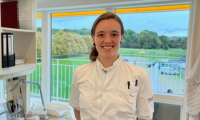Tenna Henriksen
Blood test for colorectal cancer recurrence
Tenna Henriksen has been awarded the Lundbeck Foundation's Talent Prize 2023 for her research demonstrating early detection of residual cancer DNA in the blood following treatment for colon cancer.
A simple blood test can reveal residual cancer cells in the colon just two months after surgery and chemotherapy for colon cancer. A positive test tells the doctor that there is still cancer in the body and that a scan is needed to localise the cancer so that it can be removed in time.
The explanation comes from postdoc Tenna Henriksen, MOMA – Department of Molecular Medicine at Aarhus University, a Lundbeck Foundation's Talent Prize 2023 awardee. She says:
‘Basically, my research is about detecting traces of colorectal cancer after patients have undergone colorectal cancer surgery. It’s about identifying tiny molecular DNA traces in a blood sample, as a sign that the cancer is returning.’
The critical DNA traces that Henriksen tests for are called circulating tumour DNA or ctDNA. Her previous research has been crucial in demonstrating the presence of ctDNA in the blood months before the recurrence was detected by the current monitoring programme.
In addition, she has been instrumental in developing viable laboratory procedures, optimising data analyses and interpreting the test results. If her technique proves to be reliable for implementation in hospitals, Henriksen's hope is that her research will result in more targeted colorectal cancer care and improved survival rates.
Importance of differentiating patients
One problem in colorectal cancer care today is that all patients are monitored in the same way after being treated:
‘The cancer treatment itself typically involves surgery, and if the oncologist’s clinical assessment is a high risk of relapse, the patient will additionally be offered chemotherapy. Afterwards, all patients in Denmark are offered two scans: one year after surgery, which is the period of time in which most cancers recur, and three years after surgery,’ says Henriksen.
The national statistics tell us that in 20 to 30 per cent of all patients who undergo colorectal cancer surgery, the cancer comes back, and so the challenge is to detect this at the right time:
‘The key is to identify patients at high risk of cancer relapse, who then need different cancer care from those at low risk. Once we have identified people in the high-risk category, we can start scanning them more frequently and hopefully offer effective treatment at an early enough stage,’ says Henriksen.
Conversely, patients at low risk of cancer recurrence can be spared the scans, and we avoid spending public resources on needless procedures, she explains.
‘The undifferentiated treatment of patients with colorectal cancer means that up to 80 per cent of our resources are spent on patients who do not need treatment,’ says Henriksen.
She explains that there is also another therapeutic aspect to early blood tests to detect ctDNA immediately after surgery, which is a research field making rapid advances internationally:
‘We envisage that more patients with colorectal cancer will survive after surgery alone if we detect no ctDNA in their blood test. Conversely, there is a category of patients that currently receives no chemotherapy, but that might benefit from this if we detect ctDNA in their tests. We are currently doing a study on the latter category of patients,’ says Henriksen, who refers to herself as a “boffin” in terms of getting into the details of the science involved.
Despite that, Henriksen still has her sights set on the tangible goals of conducting research in molecular medicine, outside the lab too.
‘My aim has always been for the cancer research I do to make a difference to patients and for it to have real-world applications,” Henriksen says. And this is exactly what appears to be achievable in a major randomised study that has just enrolled the last participants representing a large cohort of patients with colorectal cancer (see Fact Box).
- A randomized controlled trial means where one patient group receives the standard cancer care involving two scans within the first three years to detect cancer relapse. The other patient group has blood tests every four months to check for the presence of ctDNA.
- A total of 350 patients have volunteered to take part in the study.
- The final results will be available in about three years’ time once the last scans have been conducted.
- If the findings are clear enough, meaning that they reveal a significant positive difference favouring the use of blood tests over standard care, this may lead to hospitals changing their practice in colorectal cancer care.
Source: Postdoc Tenna Henriksen
